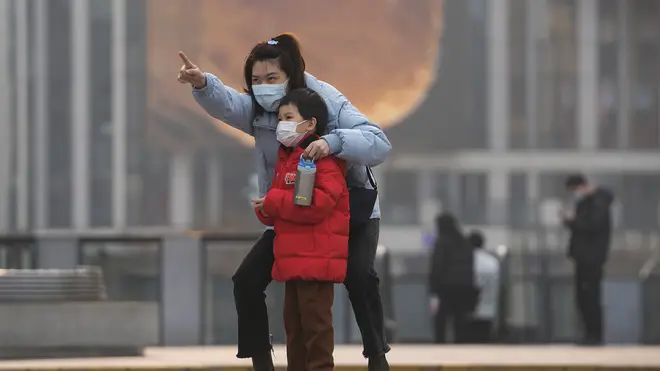
Iain Dale 7pm - 10pm
28 November 2021, 17:44

Dutch officials are continuing to test passengers who arrived from South Africa on Friday to see if they are carrying the Omicron strain of Covid-19.
The Dutch public health authority has confirmed that 13 people who arrived in the Netherlands on flights from South Africa on Friday have so far tested positive for the new Omicron coronavirus variant.
The 61 people who tested positive for the virus on Friday after arriving on the last two flights to Amsterdam’s Schiphol airport before a flight ban was put in place were immediately put into isolation while sequencing was carried out to establish if they had the new variant.
The public health institute said in a statement that testing was continuing on the samples.
Most of the 61 people who tested positive were put into isolation at a hotel near the airport, while a small number were allowed to sit out their quarantine at home under strict conditions.
Morocco has halted all incoming air travel from around the world because of the rapid spread of the new variant.
Australian officials earlier confirmed that two overseas travellers arriving in Sydney had tested positive for the Omicron variant of the coronavirus, as nations around the world tightened controls against the worrying new strain.
The two passengers were among a group of 14 who arrived in Australia from southern Africa on Saturday. Both were asymptomatic and vaccinated against Covid-19. The remaining 12 have been placed in quarantine.
Neighbouring New Zealand announced it is restricting travel from nine southern African countries because of the threat posed by the variant, and Japan widened its border controls to include more countries from the region.
Tourist-dependent Thailand, which only recently began loosening its tight border restrictions to leisure travellers from certain countries, announced a ban of its own on visitors from eight African countries.
Similar restrictions took effect in the business hub of Singapore, which is barring entry and transit to anyone with a recent history of travel to seven southern African nations.

Sri Lanka banned disembarkation of passengers arriving from six African countries due to the detection of the Omicron variant, as did the Maldives, the luxury Indian Ocean resort archipelago.
Israel went further, barring entry to all foreign nationals, mandating quarantine for all Israelis arriving from abroad and red-listing travel to 50 African countries.
It also approved use of the Shin Bet internal security agency’s controversial phone monitoring technology to perform contact tracing of individuals confirmed with the new variant.
The tighter restrictions reflect steps rapidly taken by countries around the world to limit the spread of the Omicron variant just days after it was identified by researchers in South Africa.
The “act first, ask questions later” approach reflects growing alarm about the emergence of a potentially more contagious variant nearly two years into a pandemic that has killed more than five million people, turned lives upside down, and disrupted economies across the globe.
While much remains to be learned about the new variant, researchers are concerned that it may be more resistant to the protection provided by vaccines and could mean that the pandemic lasts for longer than anticipated.
Cases involving the Omicron variant have already been confirmed on multiple continents, with Germany, Italy, Belgium, Israel and Hong Kong all reporting cases in recent days.
David Hui, a respiratory medicine expert and government adviser on the pandemic in Hong Kong, said that even though it is not clear if current coronavirus vaccines are effective against the new variant, the city’s vaccination rate should be increased and that “booster doses should be implemented as soon” as possible.
He said the two people who tested positive for the Omicron variant had received the Pfizer jab and exhibited very mild symptoms, such as a sore throat.
“Vaccines should work but there would be some reduction in effectiveness,” he said.

The United States’ top infectious diseases expert, Dr Anthony Fauci, said he would not be surprised if the new strain is already in the US too.
“We have not detected it yet, but when you have a virus that is showing this degree of transmissibility … it almost invariably is ultimately going to go essentially all over,” he said on NBC television.
In Australia, the New South Wales health department said the infected travellers arrived from one of nine African countries that are now required to quarantine in a hotel upon arrival in Sydney – South Africa, Lesotho, Botswana, Zimbabwe, Mozambique, Namibia, Eswatini, Malawi and the Seychelles.
New Zealand’s Covid-19 Response Minister, Chris Hipkins, said the island nation is taking a precautionary approach.
From late on Sunday, only New Zealand citizens from nine African countries will be allowed entry, and they will be required to spend two weeks in a quarantine hotel run by the military.
Mr Hipkins said officials are confident the variant has not entered New Zealand and they are well placed to keep it out.
Many countries have slapped restrictions on various southern African countries over the past couple of days, including Brazil, Canada, the European Union, Iran, and the US, in response to warnings over the transmissibility of the new variant.
This goes against the advice of the World Health Organisation, which has warned against any overreaction before the variant has been thoroughly studied.